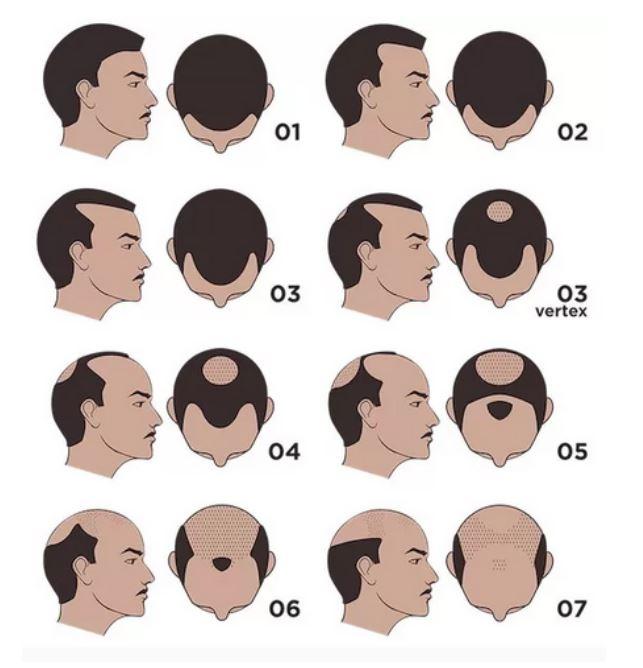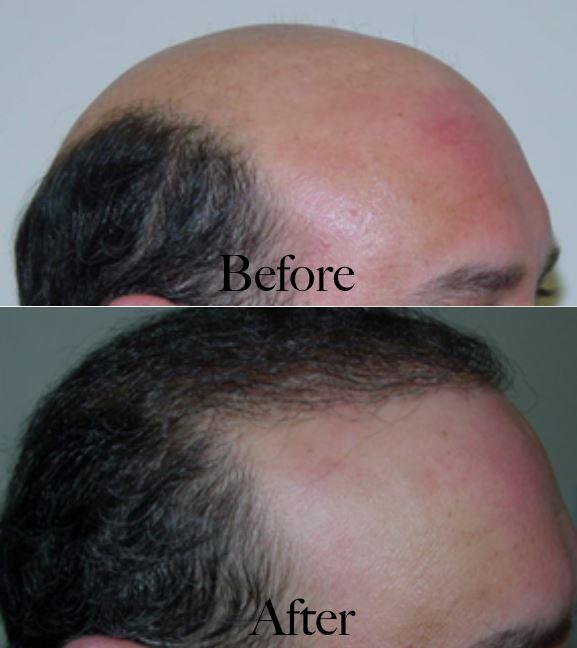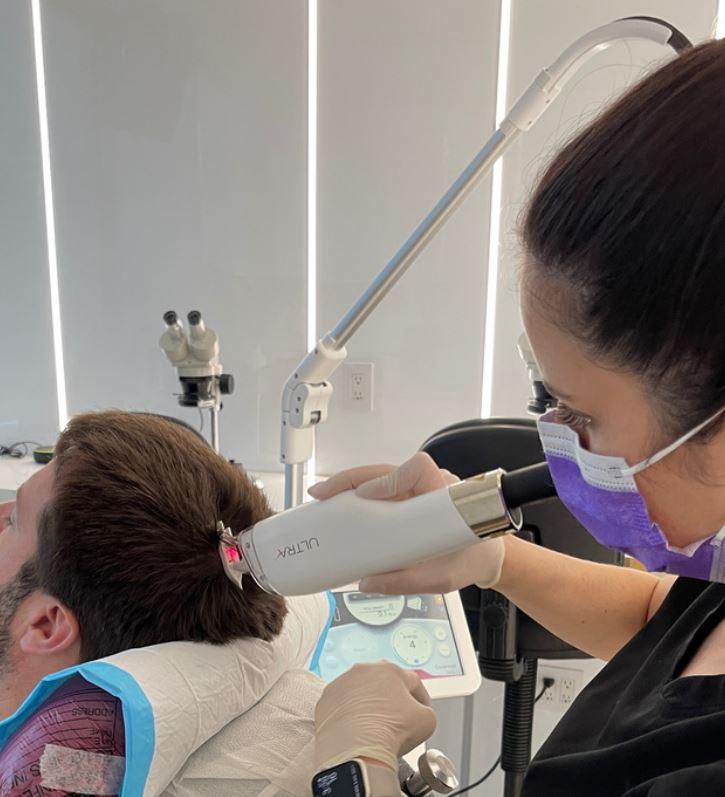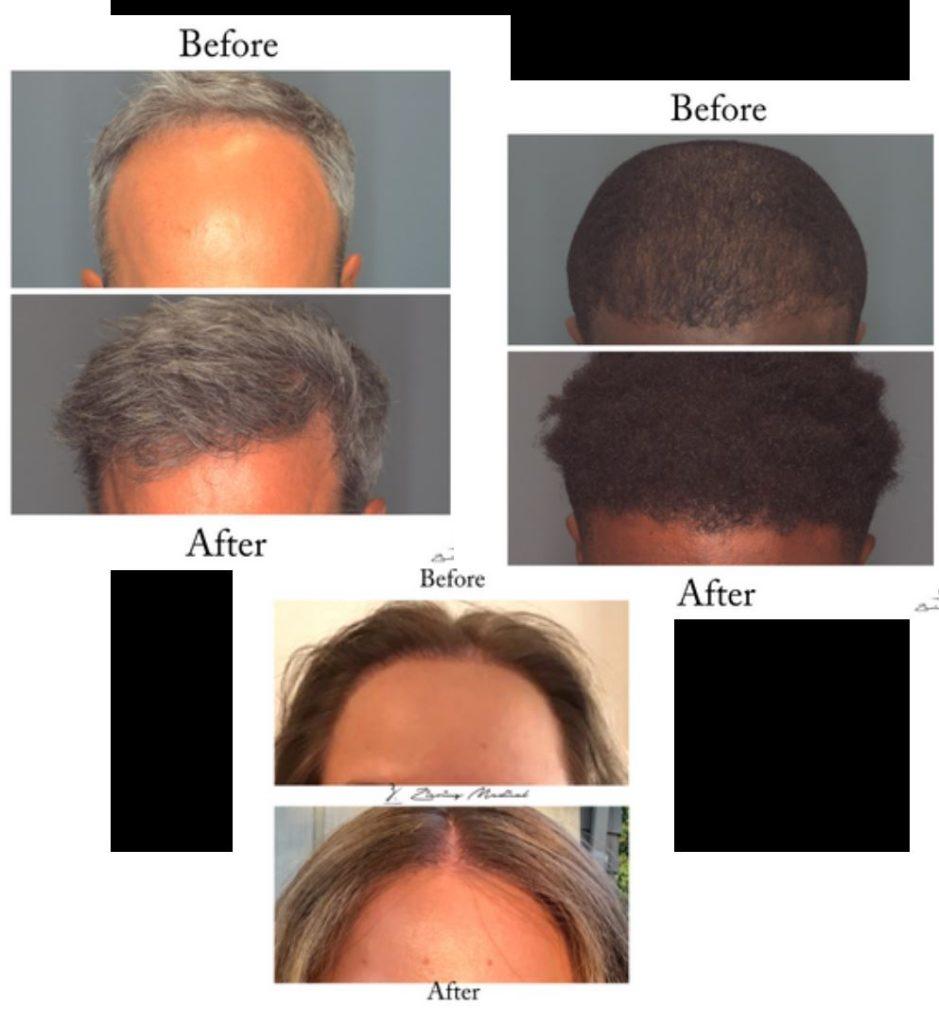From Thinning to Thriving: Understanding Hair Loss Causes and Clinically Proven Remedies
Home > White Papers > From Thinning to Thriving: Understanding Hair Loss Causes and Clinically Proven Remedies
INTRODUCING THE FUTURE OF FOLLICLE STEM CELL THERAPEUTICS
To assess and evaluate the current stage and potential progression of genetic hair loss, the Norwood and Ludwig scales are typically used.
NORWOOD SCALE


Autoimmune Conditions
Traction Alopecia

Stress-Related Hair Loss
Poor Diets and Crash Diets


Time and Age
The Proven Hair Loss Treatment Solutions
Finasteride
Finasteride, an FDA-approved medication, treats male pattern hair loss by inhibiting the enzyme 5-alpha-reductase. Thisenzyme converts testosterone to dihydrotestosterone (DHT), a more potent form of testosterone that triggers hair follicle miniaturization, resulting in smaller, weaker hairs until hair growth stops completely. As Finasteride works to decrease DHT levels, the affected follicles gradually recover and produce thicker hair. Women of childbearing age should avoid this medication due to potential fetal risks.
At Ziering Medical, we offer both forms of Finasteride:
oral tablets, ZPRO, and topical, ZFIN.
With ZFIN, our male patients have reported early results without experiencing the side effects of oral finasteride tablets. ZFIN is a unique combination of finasteride, fluocinolone, and retinoic acid that is applied to your scalp daily to reduce DHT, improve hair growth, and reduce hair shedding.

Minoxidil
Minoxidil is an FDA-approved hair growth topical and oral medication. Minoxidil, combined with other substances, can provide even more effective and long-lasting results than Minoxidil alone.
Ziering Medical’s ZMIN combines the FDA-approved hair growth medication Minoxidil with retinoic acid for enhanced penetration. It also has a blend of anti-inflammatory, antioxidant, and anti-androgen ingredients. Formula ZMIN enhances penetration of minoxidil in a non-greasy, user-friendly, formulation that stimulates hair growth and decreases hair loss for men and women.
Laser Therapy
The Z Cap is a clinically proven and FDA-cleared hair growth device to reverse male and female pattern hair loss. This device uses Low-Level-Laser Therapy (LLLT) to stimulate inactive hair follicles. It is a safe, all-natural, and painless hair growth treatment. The best thing about the Z Cap is you can treat your hair loss in the comfort of your home or while you’re on the go. More about the Z Cap at zieringshop.com.
In office laser therapy is also available at Ziering Medical
with our Keralase device which combines laser treatments with KeraFactor™, a proprietary KeraFactor Peptide Complex (KFP ™) which includes 7 Polypeptides with specifically selected growth factors and skin proteins to help with hair, skin, and scalp. This patent-pending complex helps to “turn on” weak or resting hair follicles, improve scalp circulation, and add nutrients to help produce thicker longer healthy-looking hair.

Z-Factors
Surgical Hair Transplants: FUE and MDEE®
Hair transplant procedures may be recommended especially if you have underlying male or female pattern genetic hair loss. Follicular Unit Excision and Extraction (FUE) and Microscopically Dissected Elliptical Excision (MDEE®), formerly known as FUT, are surgical hair loss solutions available at Ziering Medical.
The difference between FUE and MDEE® is that with the
MDEE® method, a precise donor strip is shaved, a linear
incision is made, and a thin strip of tissue is removed. Hair grafts are then microscopically dissected from this donor strip. In FUE, we use the same donor zone, shaving the entire back and sides of the head, but manually extracting follicular units directly from the scalp, one graft at a time.
With the recent advances in hair transplant methods, the results of these procedures can look so natural that a barber or stylist can’t tell you’ve had anything done. Hair transplant surgery is the only permanent hair loss treatment option. But you’ll have to talk to Dr. Ziering and his team of doctors to tell if you’re a good candidate for a hair transplant.


